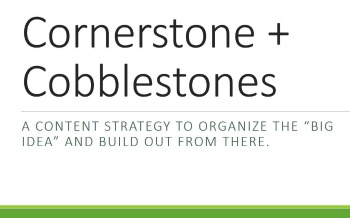I listened to the TED talk. I sat through a Webinar on the topic. And, last week, I finally read Drive, a book that’s been sitting on my shelf for a while.
In Drive, author Daniel Pink examines the research and concludes that business has it all wrong when it comes to motivating employees. The bottom line: money doesn’t buy you happiness. The better motivators (assuming an appropriate salary and benefits package, of course) are autonomy, mastery, and a sense of purpose. So companies that want to get the best out of their employees long term need to think about how to reward them differently.
For me, this is a “duh.” It took me over a year to read the book because “the surprising truth about what motivates us” isn’t surprising at all. I’ve been arguing the same thing ever since I was in graduate school.
Your “duh” moments are your expertise.
When I first argued that money wasn’t a job “satisfier” in that personnel class, I had no idea that this was a heretical business idea. I just knew that dollars don’t equate to happy, motivated, productive workers.
I wasn’t interested in a career in human resources, so I stood my ground in class and then moved on. But it has clearly continued to irk me–which is why I wrote Can Money Buy Workplace Happiness? in the first place.
And that’s the point: Don’t discount the stuff that’s easy or intuitive to you. It just might be a teachable moment for someone else.
Have you ever discounted a “duh” moment? What did you learn from it?
PS: If you haven’t read Drive, read it. While it might be obvious to me, most companies are a long way from aligning their incentives to what really motivates employees. Pink’s a good writer, and the book is an easy read that provides a lot of food for thought.
Photo by Sarah Deer (Flickr).



